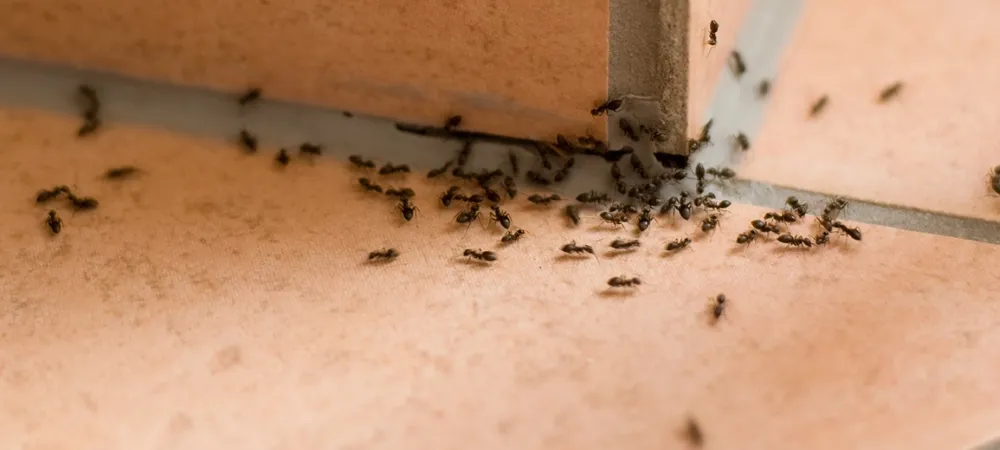What To Do About Ants in the Bathroom

As a homeowner in North Carolina, you may have noticed an unwelcome guest in your bathroom—ants. These tiny invaders seem to appear out of nowhere, marching in single file, often at the most inconvenient times. But don’t worry—you’re not alone. Due to our state’s warm and humid climate, ant infestations are a common issue across the Tar Heel State, and there are effective ways to tackle them.
In this guide, we’ll cover why ants are attracted to your bathroom and how to get rid of them for good. We’ll also highlight some local tips and tricks that are particularly relevant to North Carolina’s climate and environment.
Why Are There Ants in My Bathroom?
Ants are resourceful creatures, and your bathroom provides them with everything they need: moisture, food, and shelter. In North Carolina, the warm, humid climate can make bathrooms an ideal environment for ants, especially during the summer months when humidity levels are high.
- Moisture: The humid climate of North Carolina, especially during the summer months, creates a perfect environment for ants. Bathrooms, with their abundance of water sources, become a prime target. Leaky faucets, damp towels, and condensation can all attract ants.
- Food Sources: Ants in North Carolina are often in search of food, and bathrooms can provide a surprising variety of options. Soap scum, toothpaste residue, and even dead skin cells can serve as a food source for ants.
- Shelter: Bathrooms, particularly in older homes, may have hidden spaces behind walls, under floors, or around pipes where ants can build their nests.
- Entry Points:
- Scent Trails: Ants are known for following scent trails left by other ants. Once one ant finds a food source in your bathroom, it will leave a trail for others to follow, leading to an infestation.
In North Carolina, common ant species like odorous house ants or Argentine ants are known to seek out these cozy spots, especially during warmer months. The combination of moisture, food sources, and potential nesting sites makes your bathroom a prime target for ants looking to thrive indoors.
How to Get Rid of Ants in Your Bathroom
Step 1: Identify the Source of the Problem
The first step in getting rid of ants is to find out where they’re coming from. North Carolina homes, particularly older ones, may have small gaps or cracks in the foundation, around windows, or through gaps in plumbing. Ants can easily enter through these small openings and make their way to your bathroom. Inspect your bathroom carefully to identify these entry points. Look for trails of ants, which can lead you directly to their nest or entry point.
Step 2: Eliminate Moisture
Ants are attracted to moisture, so it’s important to keep your bathroom dry. Fix any leaks in your sinks, toilets, or shower areas, and make sure your bathroom is well-ventilated. In humid areas like Asheville, Greensboro, or Wilmington, using a dehumidifier can help reduce the moisture levels in your bathroom, making it less appealing to ants.
Step 3: Clean Thoroughly
Regular cleaning is essential to eliminate any food sources that might attract ants. Pay special attention to the following areas:
- Sinks and Countertops: Wipe down these surfaces daily to remove soap scum, toothpaste, and any food particles.
- Shower and Bathtub: Clean the corners and edges of your shower or tub where moisture can accumulate.
- Floors: Sweep and mop the bathroom floor regularly to remove any crumbs or debris that could attract ants.
Step 4: Use Ant Baits
Ant baits are one of the most effective ways to eliminate ants in the bathroom. Place ant baits near the areas where you’ve seen ant activity. The ants will carry the bait back to their colony, effectively eliminating the entire nest. In North Carolina, popular bait types include gel baits and bait stations, which are available at most hardware stores.
Step 5: Seal Entry Points
After you’ve eliminated the ants, it’s important to seal off any entry points to prevent future infestations. Use caulk to seal cracks around windows, doors, and plumbing fixtures. In older homes commonly found in Durham or Chapel Hill, it’s also a good idea to inspect and seal any gaps in the walls or floorboards.
Step 6: Consider Natural Remedies
If you prefer a more natural approach, there are several options that can help deter ants. For example, sprinkling diatomaceous earth around the perimeter of your bathroom can help keep ants at bay. Additionally, using essential oils like peppermint or tea tree oil can be an effective repellent. Simply mix a few drops with water in a spray bottle and apply it to areas where ants are entering.
Step 7: Call a Professional
If the infestation is severe or if you’ve tried multiple methods without success, it may be time to call in your professional pest control service at like Rid-A-Pest Inc.. As a local company, we are familiar with the specific ant species common to the area and can provide targeted treatments that are more effective than over-the-counter solutions.
To learn more about our comprehensive residential pest control service, contact our team today!
